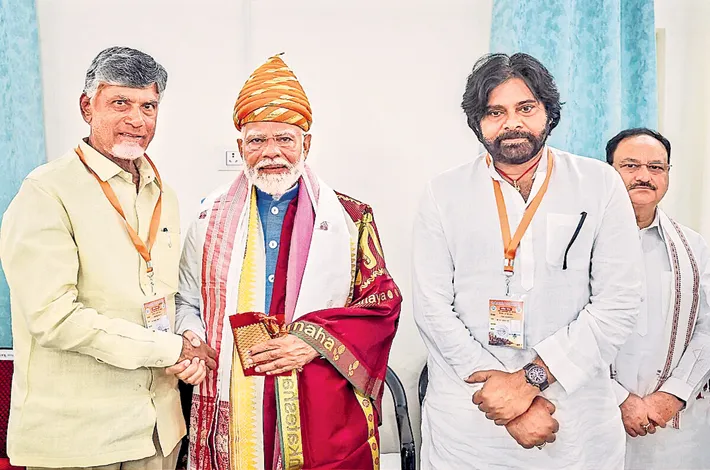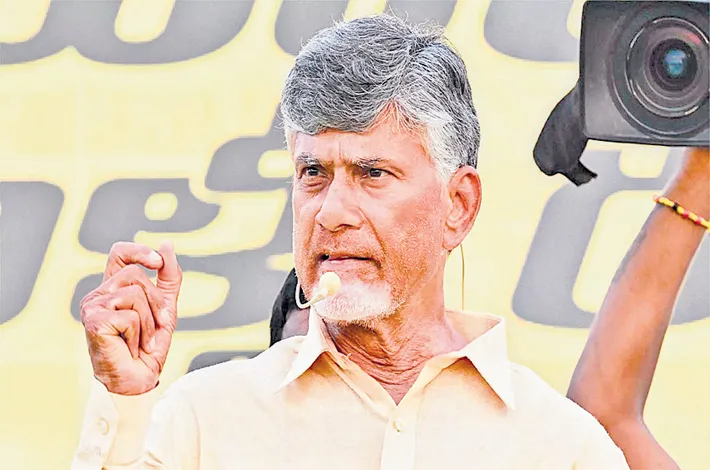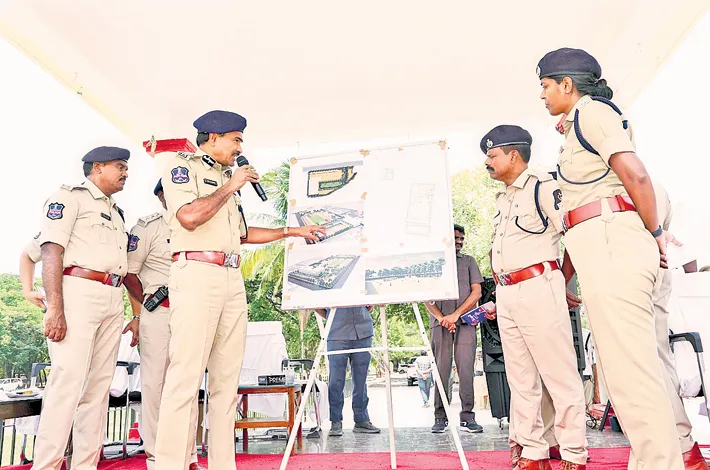One year NDA rule: A bold return, tangible gains, and miles to go
04-06-2025 12:00:00 AM

kiranmai tutika I AMARAVATI
A year after the historic return of the N. Chandrababu Naidu-led Telugu Desam Party (TDP) in alliance with the Bharatiya Janata Party (BJP) and Jana Sena Party (JSP), Andhra Pradesh stands at a crossroads—rebuilding a debt-ridden state while attempting to deliver on sky-high electoral promises. Marking the completion of one year in office today, the NDA coalition government faces a complex mix of promise, pressure, and potential.
When the NDA took power on June 4, 2024, with a staggering 164 out of 175 Assembly seats and 21 out of 25 Lok Sabha seats, it signaled a dramatic shift in public mood. The result was not just a rejection of the YSR Congress Party's tumultuous rule but a vote of confidence in Chandrababu Naidu’s seasoned leadership and Pawan Kalyan’s disruptive grassroots energy. Yet, the political capital came with a fiscal burden. The new government inherited a financially ravaged state with Rs.5 lakh crore in off-budget liabilities and mounting debt servicing costs.
Despite financial constraints, the TDP-JSP-BJP government has made notable strides. Naidu, known for his technocratic vision, placed development and infrastructure at the heart of his governance model.
The stalled Amaravati capital project was revived with renewed urgency, and the long-delayed Polavaram irrigation project was put back on track, now slated for completion by December 2028. Bringing back the lost glory, the CHIEF MINISTER is going around common people, to their villages, streets, and even spending time in their houses and work spaces sharing a cup of tea—rebuilding the lost connection in the democracy.
Naidu’s diplomatic finesse with the BJP-led Centre yielded significant dividends—over Rs.50,000 crore in central support, including Rs.15,000 crore for Amaravati and key funding commitments for Polavaram and the revival of Vizag Steel Plant. Under the banner of “Vision 2047: Swarna Andhra,” the administration laid out a long-term roadmap that prioritizes innovation, private investment, and inclusive development. Initiatives such as “WhatsApp Governance” introduced a fresh wave of tech-led transparency and accountability in public service delivery.
Notably, Google’s decision to invest in Visakhapatnam emerged as a strong signal of investor confidence under the current regime, promising high-skilled jobs and global partnerships.
The TDP’s much-publicized “Super Six” election promises, however, remain only partially fulfilled. Of the six guarantees, so far free distribution of three LPG cylinders per year has been implemented. While enhanced pensions of Rs.4,000 are already being given, and the upcoming Annadata Sukhibhava for farmers, Thalliki Vandanam Scheme underscore a commitment to social welfare, yet they are on the path of progress.
Meanwhile, as Pawan Kalyan's entry into power politics reached a high watermark in 2024, with Jana Sena Party winning all 21 seats it contested. In government, Pawan has balanced his fiery activist persona with institutional responsibility. While he has left the economic reins to Naidu, he remains the conscience keeper of the coalition, urging prompt delivery on welfare fronts and warning against bureaucratic complacency.
Although there were incidents like seizing illicit rice exports in Kakinada port and his furious remarks on State Home Minister, Deputy Chief Minister Pawan Kalyan’s influence has been instrumental, especially in the government, to stay focused on people-centric policies. Kalyan’s persistent engagement with rural and semi-urban constituencies has kept public expectations high and to an extent he delivered his best by providing better infrastructure facilities to tribal belts.
The rise of Nara Lokesh, Naidu’s son and a key Cabinet player, has triggered whispers about internal balancing acts. Naidu must deftly manage the optics and ensure Pawan Kalyan continues to feel empowered, or face the risk of fractures in what has so far been a disciplined alliance.
Despite formidable obstacles, the NDA government has navigated its first year with a mix of resolve and realism. Naidu’s developmental approach, supported by strategic central partnerships and Pawan Kalyan’s regional energy, has restored administrative direction and policy focus.
Year one of the Chandrababu-Pawan era has been about damage control, groundwork, and cautious optimism. With Vision 2047 as the North Star, Amaravati rising again, and fiscal reforms underway, the coalition has carved a narrative of hope. But to truly deliver Swarna Andhra, the government will have to turn political stability into economic agility, and vision into visible results. The people of Andhra Pradesh have voted for transformation. Now, they are watching—and waiting.








